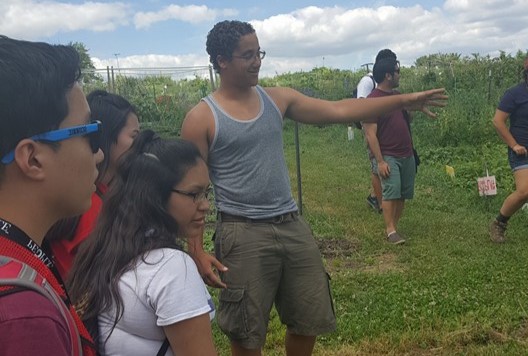 “The low-income neighborhood we live in is a food desert,” says Will Green, founder of Mentoring Positives in the Darbo-Worthington Neighborhood on Madison’s east side. Green, speaking in the Michael Fields Agricultural Institute’s successful video application for a Game Changer Grant, adds, “A lot of the people I work with are shopping at Walgreens or the gas station or Taco Bell or McDonald’s. It’s just unhealthy and unsustainable.”
“The low-income neighborhood we live in is a food desert,” says Will Green, founder of Mentoring Positives in the Darbo-Worthington Neighborhood on Madison’s east side. Green, speaking in the Michael Fields Agricultural Institute’s successful video application for a Game Changer Grant, adds, “A lot of the people I work with are shopping at Walgreens or the gas station or Taco Bell or McDonald’s. It’s just unhealthy and unsustainable.”
Green’s organization started making and selling Off the Block Salsa, which local youth created all the way from planting tomato and pepper seeds to putting the labels on the jars.
It’s that kind of involvement with the food system that can transform a generation, which is the driving force behind The GULFS program from Michael Fields Agricultural Institute for Agriculture, which won this month’s Game Changer grant from Forward Community Investments.
GULFS — Growing Urban Leaders in Food Systems — is currently a pilot program to provide curriculum and resources to community organizations and schools to engage youth, especially youth of color, in new ways of thinking about food, food production and most importantly food justice.
“It exposes youth, especially youth of color, to what a food system is,” says MFAI assistant policy director Devon Hamilton. “What is a food system and what is my part in it?”
Hamilton says the curriculum went over well in its first couple of tries.
“It went over pretty well and now we’re in the second phase of it, partnering with other organizations in Madison and Milwaukee,” he says.
That will include working with two community gardens in Madison this summer — the Mellow Hood Community Garden in the Meadowood neighborhood and Brentwood Garden on the north side.
“It goes over the entire summer,” Hamilton says. “Kids will be able to interact with us from when they get out of school until they get back into school.”
The concepts and skills learning through the gardening and food system curriculum will have wider applications, Hamilton says, creating not just more food system awareness but social activism.
“Our curriculum will teach the skills like how to research, how to interview, how to do presentations,” Hamilton says. “We want students to feel empowered and take on projects themselves. They can have a direct change in their communities that’s tangible, that they can see, to get them excited to continue doing the work.”
After the summer programs, MFAI will look to implement the GULFS curriculum in schools, including Badger Rock Middle School in Madison and Harold S. Vincent High School in Milwaukee, in the next year or two.
“We’re focused on project-based learning but also in the urban agriculture context,” says Badger Rock Interim Principal Hong Tran. “We’ve been going through a new way of thinking about urban agriculture recently. One way that we find that’s coming up especially in Madison and in the South Side area here is around food access and food justice. We’re working with the Michael Fields Institute to explore connections around teaching students the different aspects of agriculture but more importantly the social aspects of agriculture, especially urban agriculture.”
Forward Community Investments has awarded MFAI a $3,000 grant to fund the GULFS program through its Game Changer program, which funds projects working toward racial equity across Madison.
The Game Changer program is unique in that it uses a simpler and less time-consuming application process than typical nonprofit grants: a short informational form and a five-minute video.
“It was definitely unique,” Hamilton says of the Game Changer application process. “It was interesting to fit so much of what we’re doing in that five minute video. It was a good break. It really challenged us to be concise about what our mission is and what we’re trying to do. We had a good time making that video.”
This is the third Game Changer grant awarded by FCI. Previous grants went to Fit Oshkosh, which does racial literacy training throughout the Fox Valley, and the Workers Rights Center to fund the Wage Theft Monitor Program.
More than 50 organizations submitted videos for the first round of grants. What makes the program especially unique is that it’s not just a one-time award; instead, one $3,000 grant winner will be announced monthly throughout 2017.
In its capacity as a Community Development Financial Institution (CDFI), Forward Community Investments builds stronger and healthier communities by providing loans, advising, and grants to mission-based organizations that address the root causes of racial inequities and socioeconomic disparities. FCI supports initiatives that improve equity and make positive change possible. Its vision is an equitable and inclusive Wisconsin built on cooperative social action. For more information about FCI, go to www.forwardci.org.




























